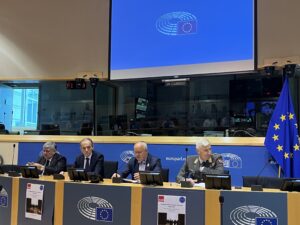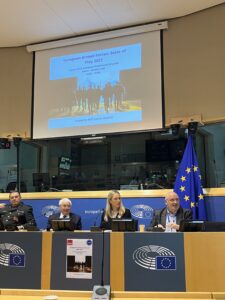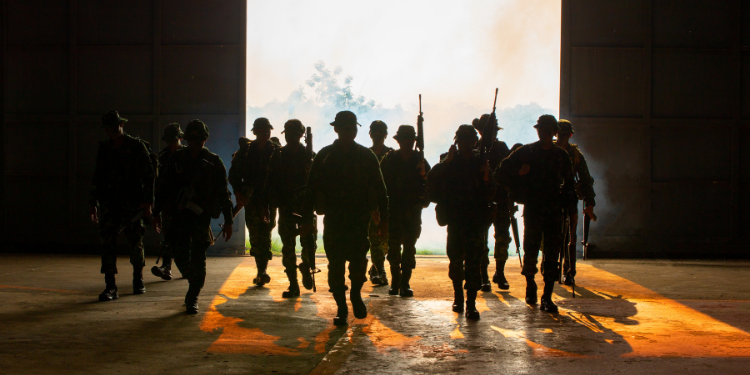European Armed Forces: State of Play 2023
On 8 June 2023, EUROMIL organised a two-panel event on the European Parliament, hosted by MEP Juozas OLEKAS entitled “European Armed Forces: State of Play 2023”. The first panel discussion focused on the implementation of the Strategic Compass and the creation of the Rapid Deployment Capacity. During the opening remarks, MEP Olekas underlined the importance of the Strategic Compass as a guiding document for the Union’s security and defence. The Rapid Deployment Capacity, the reinforcement of the eastern flank, the CSDP missions and operations require commitment by the Member States and raise the important question whether they have the necessary means to fulfil their international obligations in terms of personnel and resources. It was also underlined that closer cooperation between the EU and NATO is required to deal with emerging threats and challenges as climate change.
At the first panel discussion, the Chairman of the EU Military Committee, General Robert Brieger, presented the objectives of the Strategic Compass under the Act pillar focusing on the Rapid Deployment Capacity, which will be constituted of 5000 troops covering air, land and sea alongside the necessary strategic enablers. The first live exercise (MILEX-23) will take place in October in Spain under the Spanish presidency of the Council and will be funded by the EU. The Member States have shown unprecedent will to reinforce CSDP, as it can be seen by the EU Military Assistance Mission (EUMAM) in Ukraine, which aims to train 30000 soldiers (more than 15000 have already completed the training). The importance of the Military Planning and Conduct Capability (MPCC) was also mentioned with the aim of becoming the Operational HQ for the Rapid Deployment Capacity. Furthermore, Dr Frédéric Mauro highlighted the need to have willing Member States to move towards further defence integration, hence a coalition of the willing could be the answer. The EU needs to build a strong European Defence able to deal with crisis management when the Americans cannot intervene and at the same time become a credible partner and reinforce the European pillar in NATO. Lastly, the moderator Jo Coelmont concluded that a Zeitenwende is taking place in Europe but the necessary political will is needed to make it last and make a change.
The second panel discussion focused on the use of the reserve forces and the question of dealing with emerging threats and challenges as climate change. LtCol (R) Luc Audoore presented the challenges that the reserve forces are facing in Belgium, while underscoring that currently they provide a pool of expertise to the Armed Forces in plenty of domains where there is a shortage or need within the Belgian Defence. Besides, Jordan Koop presented NATO’s agenda on climate change by focusing on the Strategic Concept which states that NATO aims to become a leading organisation in climate and security. NATO has also developed the Climate Change and Security Action Plan which is comprised of four pillars: Awareness, Adaptation, Mitigation and Outreach. For the moment NATO is focusing on defence and deterrence, and support to Ukraine for its sovereignty. But, climate change will also be on the agenda of the Vilnius Summit. It was also underlined by the participants that military personnel will need the necessary training and equipment to be able to effectively respond to climate change and operate under extreme weather conditions. As it was also stated by the moderator, Dr Jamie Shea, climate change is also at the 3rd EU-NATO Joint Declaration and cooperation in this domain between the two organisations is essential. 
Lastly, the President of EUROMIL, Mr Emmanuel Jacob, closed the event by mentioning the importance of not forgetting the men and women in uniform when building strategies and policies, because they are the ones that make it a reality.

